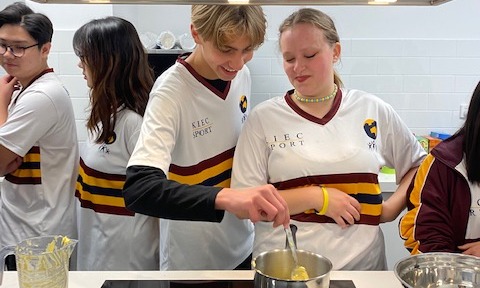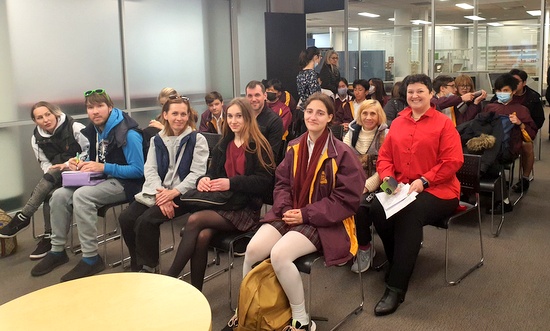New arrivals who have fled the war in Ukraine and other conflicts face a raft of uncertainties as they settle in Australia but Advance Diversity Service (ADS) has joined forces with community and settlement services to smooth their transition.
“Empowering refugee youth and children, leads to empowering the whole family,” said Magdaline Shenton-Kaleido, Team Leader, Emerging Communities, Settlement and Community Services for ADS.
“Our recent joint activities, which have focused on connecting young people to local services so that they can access them independently, have definitely had this flow-on effect, which is marvellous.”
On June 10, ADS worked with Kogarah IEC (Intensive English College) and 3Bridges Community to organise a visit to 3Bridges Youth Zone Penshurst. Over 80 students from a range of cultural backgrounds (including the Ukraine) were involved in the activities, getting to know the services on offer that they can access.
The settlement team at ADS was also introduced to the Ukrainians, the newest emerging refugee community arriving in Australia, through the Kogarah Intensive English Centre (KIEC) when it invited a number of services including ADS to address the parents of the young people attending the school.
Key speakers from RACS (Refugee and Casework Services – for visa options and pathways) Settlement Services International (SSI – for humanitarian settlement case management support), TAFE, Refugee Health and STARTTS provided a holistic view of support services people could access immediately.
Ms Shenton-Kaleido said, “Refugees, like all migrants, learn and get connected through their children, who often become the language and cultural guides for their parents to help navigate all the new systems.
“We build bridges so young people can find their own way – which in turn fosters links with families that can help them settle more easily.”
One such bridge was built on June 24 when ADS worked with KIEC to organise an outing to Arncliffe Youth Centre to help students socialise, make new friends, and learn how to access services.
Refugee Week builds connections
Ms Shenton-Kaleido said ADS had partnered in several Refugee Week events, which provided excellent opportunities to connect with newly arrived young people and their families.
On June 21, ADS and Sydney Multicultural Community Services spoke at a Bayside Council event about the services and supports available to refugees settling in the area. The following day, ADS and the council offered an informative and engaging session for recently arrived refugees, including new Ukrainian arrivals, which incorporated an interactive tour of Rockdale Library and the council chambers.
Also, on June 22, ADS teamed up with Georges River Council at Hurstville Library to offer 20 students from the KIEC and eight Ukrainian newcomers the chance to tour the library and hear about the settlement services available to new arrivals.
“I spoke about the SETS program and how this helps newcomers understand the new systems they have to navigate in Australia,” Ms Shenton-Kaleido said. “The students took home the SETS flyers for their parents. There were Ukrainian, Thai, Cantonese, Mandarin and Vietnamese speakers in the student group – some of whom were international students, humanitarian entrants or here on other migrant visas.”
Feedback from the Ukrainian adults who attended the session was insightful.
“The adults were very interested in hearing about our program and how we could work with this newest emerging community, to support community development, and co-design workshops and information sessions that would benefit them,” Ms Shenton-Kaleido said,
“Because the visa most of these people are on here is a new visa for the Ukrainians, their family and friends do not really know how to advise them, nor understand what they can access at any part of their settlement journey.”
Ms Shenton-Kaleido said all of the Ukrainians she’d spoken with felt they were living in a very precarious situation.
“Many are women and children, missing and worrying about loved ones left behind in an active conflict zone. Some have come as couples with children.
“One family asked, “What will happen after three years? Is there a permanent pathway to citizenship?”“
Additionally, she said, the Ukrainians wanted to work, become financially independent and get on with their lives but knew nothing about what was available to them or how the systems worked here. They asked numerous questions about Centrelink and Special Benefits, Medicare, TAFE, hospitals, work, renting, tax, superannuation and how to get their driver’s licence.
“It is very overwhelming to flee conflict, move from place to place, leave everything you have behind and arrive in unknown circumstances in a new country, on the other side of the world, so far away from loved ones,” Ms Shenton-Kaleido said.
“Many feel they’re living in a completely different world where everything is upside down – ‘the moon is upside down, day is night, night is day’. They have to plan when to make phone calls to loved ones. It’s all so different.
“They also have difficulty renting properties because they have no history here, and agents think they will just up and leave when the war ends ... but when will the war end?
“When I asked one woman how she liked Australia, she said, ‘Australia is a beautiful country and in any other circumstances, I would be able to enjoy it, but right now I just worry about my family, my country.’”

ADS worked with Kogarah Intensive English Centre and 3Bridges Community to
organise a visit to 3Bridges Youth Zone Penshurst on June 10.
Over 80 students were involved in the activities.
For more information about ADS’s Settlement Services see https://www.advancediversity.org.au/services/migrant-services/settlement-engagement-and-transition-support/

